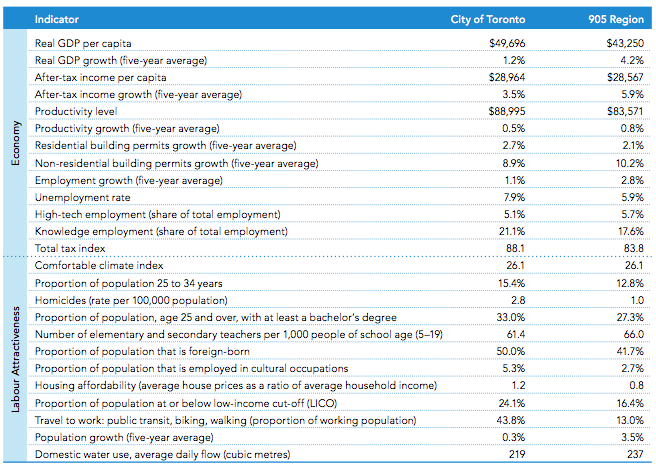Where I work, our servers are stored somewhere in Mississauga. It is a server farm. No doubt, the jobs at that facility are classified as "high-tech", but they are more closely understood as industrial, keeping the thing running. The people who design the sites, who research the data, who decide on the architectures, none of them, in the case of my company, work in Mississauga
.
Your point is that because your job has "industrial" jobs in the suburbs and the "high tech" jobs are not, the trend of higher productivity jobs migrating to the 905 is invalid? All that productivity and employment growth just doesn't exist? This is high school level argumentation, and you accuse me of manipulating statistics no less.
"Creative" = "High tech". Hilarious. And I'm not even a believer of Florida.
It is creative. Florida or no Florida. If your job involves a high level of technological sophistication and applied knowledge, you are part of the creative class. This is self evident. I at no time said that "creative=high tech", I said high tech is clearly a form of creativity. You know, "all politicians are liers, but not all liers are politicians" type stuff.
The only funnier comment is "attractive corporate landscapes". Yeah, either drive to Arby's for lunch, or eat in the cafeteria. Lovely
Sorry to break your bubble, but when most companies are looking to make more money they don't exactly consider proximity to a chic gastro-bar a priority. I thought it was self evident that by "attractive corporate landscape" I meant things like low cost, low taxes and so forth. I'm pretty sure I even prefixed "attractive corporate landscape" with those descriptions. Anyways, when was the last time you were in PATH? All the Manchu Woks and Jimmy the Greeks do great business. I don't think there is an Arby's there, but if there were I'm pretty sure it would do great business as well. Thats not even getting into the other 90% of the 416, which is basically identical in Arby's concentration to the 905.
Toronto has more young people, a higher rate of 'knowledge' employment, more jobs in the cultural (read: creative) sector, more university educated people and more young people.
And yet for all of that, we have a higher unemployment rate, a quarter of the population living beneath LICO (which I don't necessarily think is a great measurement, but whatever), about a quarter of the real GDP growth and a bit less than half the employment growth vis a vis the 905. A lot of our apparent success in fields like "knowledge employment" can be explained by the concentration UofT, York, Ryerson, the Colleges & OCAD within the 416, as well as a things like the Ontario Government. While I think that is great, it is also a bit naive to suggest that something so utterly dependent on public funding is our ticket to economic success. Ditto for the "cultural sector," the 416 clearly gets a disproportionate amount of public funding for "cultural" activities. And before someone calls me a philistine, I'm not saying that is a bad thing. Just that the Canadian Opera Company is never going to be a cash cow for the city. So the question remains for the creative class theory, why has the 416's clear advantage in "creative" jobs not lead to a corresponding increase in employment growth and productivity? Or put another way, why has the 905 succeeded in attracting new employment and fostering productivity without these "creative" amenities?
Toronto's slow growth is troubling, but it also hints at some inherent stability to our city's economy. We're certainly not in danger of crashing like, say, Calgary could when resource conditions change.
Fair enough about Calgary, but the 416 also got beat by superficially similar cities like Quebec and New York which aren't predicated on a single commodity.





